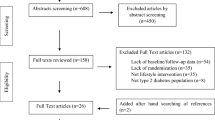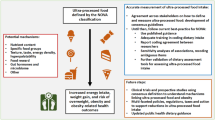Abstract
Purpose
The association between selenium supplementation and glycemic indices seems to be a controversial issue. This systematic review and meta-analysis was conducted to evaluate the effect of selenium supplementation on glycemic indices.
Methods
We systematically searched PubMed/MEDLINE, ISI/WOS, and Scopus (from their commencements up to Jan 2016) for relevant studies examining the association between intake of selenium and glycemic indices. The data were extracted from relevant qualified studies and estimated using the random-effect or pooled model and standardized mean difference (SMD) with 95% confidence interval (CI).
Results
Twelve articles published between 2004 and 2016 were included. In all the studies, the participants were randomly assigned to an intervention group (n = 757) or a control group(n = 684). All the studies were double blind, placebo controlled trials. Selenium supplementation resulted in a significant decrease in homeostasis model of assessment-estimated β-cell function (HOMA-B) (SMD: -0.63; 95%CI: −0.89 to −0.38) and a significant increase in quantitative insulin sensitivity check index (QUICKI) (SMD: by 0.74; 95%CI: 0.49 to 0.1) as compared with the controls. There were no statistically significant improvements in glycemic indices, such as fasting plasma glucose (FPG), insulin, homeostasis model of assessment-estimated insulin resistance (HOMA-IR), Hemoglobin A1c (HbA1c) and adiponectin.
Conclusion
This meta-analysis indicated that selenium supplementation significantly decreased HOMA-B and increased QUICKI score. There was no statistically significant improvement in FPG, insulin, HOMA-IR, HbA1c and adiponectin indices following selenium supplementation.








Similar content being viewed by others
References
Duntas LH, Benvenga S. Selenium: an element for life. Endocrine. 2015;48(3):756–75.
Carlson BA, Yoo M-H, Shrimali RK, Irons R, Gladyshev VN, Hatfield DL, et al. Role of selenium-containing proteins in T-cell and macrophage function. Proc Nutr Soc. 2010;69(3):300–10.
LH D. Selenium and inflammation: underlying anti-inflammatory mechanisms. Horm Metab Res. 2009;41(06):443–7.
Hatfield DL, Gladyshev VN. The outcome of selenium and vitamin E Cancer prevention trial (SELECT) reveals the need for better understanding of selenium biology. Mol Interv. 2009;9(1):18–21.
Hoffmann FKW, Hashimoto AC, Shafer LA, Dow S, Berry MJ, Hoffmann PR. Dietary selenium modulates activation and differentiation of CD4+ T cells in mice through a mechanism involving cellular free thiols. J Nutr. 2010;140(6):1155–61.
Diplock AT. Antioxidants and disease prevention. Mol Asp Med. 1994;15(4):293–376.
Nève J. Selenium as a risk factor for cardiovascular diseases. J Cardiovasc Risk. 1996;3(1):42–7.
Liu R, Xia L, Zhuoya Z, Min Z, Yue S, Dinglei S, et al. Allogeneic mesenchymal stem cells inhibited T follicular helper cell generation in rheumatoid arthritis. Sci Rep. 2015;5:12777.
Fasano E, Serini S, Mondella N, Trombino S, Celleno L, Lanza P, et al. Antioxidant and anti-inflammatory effects of selected natural compounds contained in a dietary supplement on two human immortalized keratinocyte lines. Biomed Res Int. 2014;2014:1–11.
Wang C, Yang S, Zhang N, Mu Y, Ren H, Wang Y, et al. Long-term supranutritional supplementation with selenate decreases hyperglycemia and promotes fatty liver degeneration by inducing hyperinsulinemia in diabetic db/db mice. PLoS One. 2014;9(7):e101315.
Campbell SC, Aldibbiat A, Marriott CE, Landy C, Ali T, Ferris WF, et al. Selenium stimulates pancreatic beta-cell gene expression and enhances islet function. FEBS Lett. 2008;582(15):2333–7.
Stranges S, Ana N-A, Rayman MP, Eliseo G. Selenium status and cardiometabolic health: state of the evidence. Nutr Metab Cardiovasc Dis. 2010;20(10):754–60.
Stranges S, Marshall James R, Raj N, Donahue Richard P, Maurizio T, Combs Gerald F, et al. Effects of long-term selenium supplementation on the incidence of type 2 DiabetesA randomized TrialSelenium supplementation and risk for type 2 diabetes. Ann Intern Med. 2007a;147(4):217–23.
Lippman SM, Klein Eric A, Goodman Phyllis J, Scott LM, Thompson Ian M, Ford Leslie G, et al. Effect of selenium and vitamin E on risk of prostate cancer and other cancers: the selenium and vitamin E Cancer prevention trial (SELECT). Jama. 2009;301(1):39–51.
Zhou J, Huang K, Lei XG. Selenium and diabetes—evidence from animal studies. Free Radic Biol Med. 2013;65:1548–56.
Moher D, Liberati A, Tetzlaff J, Altman DG. Preferred reporting items for systematic reviews and meta-analyses: the PRISMA statement. PLoS Med. 2009;6(7):e1000097.
Nikuei P, Nahid D, Iman T, Ali KA. Predictive value of miR-210 as a novel biomarker for pre-eclampsia: a systematic review protocol. BMJ Open. 2016;6(9):e011920.
Khosravi M, Djalalinia S, Hasani M, Saeedi Moghaddam S, Kazemzadeh Atoofi M, Asayesh H, et al. Effects of selenium supplementation on cardiometabolic risk factors, inflammatory factors and antioxidant factors : a systematic review and meta-analysis protocol. IJPM. 2017; (Submitted).
Hozo SP, Benjamin D, Iztok H. Estimating the mean and variance from the median, range, and the size of a sample. BMC Med Res Methodol. 2005;5(1):13.
DerSimonian R, Laird N. Meta-analysis in clinical trials. Control Clin Trials. 1986;7(3):177–88.
Whitehead A, Whitehead J. A general parametric approach to the meta-analysis of randomized clinical trials. Stat Med. 1991;10(11):1665–77.
Higgins JP, Thompson SG, Deeks JJ, Altman DG. Measuring inconsistency in meta-analyses. BMJ. 2003;327(7414):557–60.
Intercooled Stata. 8.0 for windows. College Station, TX: Stata Corp; 2003. 2007.
Alizadeh M, Safaeiyan A, Ostadrahimi A, Estakhri R, Daneghian S, Ghaffari A, et al. Effect of L-arginine and selenium added to a hypocaloric diet enriched with legumes on cardiovascular disease risk factors in women with central obesity: a randomized, double-blind, placebo-controlled trial. Ann Nutr Metab. 2012;60(2):157–68.
Asemi Z, Jamilian M, Mesdaghinia E, Esmaillzadeh A. Effects of selenium supplementation on glucose homeostasis, inflammation, and oxidative stress in gestational diabetes: randomized, double-blind, placebo-controlled trial. Nutrition. 2015;31(10):1235–42.
Bahmani F, Kia M, Soleimani A, Asemi Z, Esmaillzadeh A. Effect of selenium supplementation on glycemic control and lipid profiles in patients with diabetic nephropathy. Biol Trace Elem Res. 2016;172(2):282–9.
Faghihi T, Radfar M, Barmal M, Amini P, Qorbani M, Abdollahi M, et al. A randomized, placebo-controlled trial of selenium supplementation in patients with type 2 diabetes: effects on glucose homeostasis, oxidative stress, and lipid profile. Am J Ther. 2014;21(6):491–5.
Farrokhian A, Bahmani F, Taghizadeh M, Mirhashemi SM, Aarabi MH, Raygan F, et al. Selenium supplementation affects insulin resistance and serum hs-CRP in patients with type 2 diabetes and coronary heart disease. Horm Metab Res. 2016a;48(04):263–8.
Faure P, Ramon O, Favier A, Halimi S. Selenium supplementation decreases nuclear factor-kappa B activity in peripheral blood mononuclear cells from type 2 diabetic patients. Eur J Clin Investig. 2004;34(7):475–81.
Jamilian M, Razavi M, Fakhrie Kashan Z, Ghandi Y, Bagherian T, Asemi Z. Metabolic response to selenium supplementation in women with polycystic ovary syndrome: a randomized, double-blind, placebo-controlled trial. Clin Endocrinol. 2015;82(6):885–91.
Mao J, Bath SC, Vanderlelie JJ, Perkins AV, Redman CWG, Rayman MP. No effect of modest selenium supplementation on insulin resistance in UK pregnant women, as assessed by plasma adiponectin concentration. Br J Nutr. 2016;115(1):32–8.
Murer SB, Aeberli I, Braegger CP, Gittermann M, Hersberger M, Leonard SW, et al. Antioxidant supplements reduced oxidative stress and stabilized liver function tests but did not reduce inflammation in a randomized controlled trial in obese children and adolescents. J Nutr. 2014;144(2):193–201.
Rayman MP, Blundell-Pound G, Pastor-Barriuso R, Guallar E, Steinbrenner H, Stranges S. A randomized trial of selenium supplementation and risk of type-2 diabetes, as assessed by plasma adiponectin. PLoS One. 2012;7(9):e45269.
Shargorodsky M, Debby O, Matas Z, Zimlichman R. Effect of long-term treatment with antioxidants (vitamin C, vitamin E, coenzyme Q10 and selenium) on arterial compliance, humoral factors and inflammatory markers in patients with multiple cardiovascular risk factors. Nutr Metab (Lond). 2010;7:55.
Mohammad Hosseinzadeh F, Hosseinzadeh-Attar MJ, Yekaninejad MS, Rashidi B. Effects of selenium supplementation on glucose homeostasis and free androgen index in women with polycystic ovary syndrome: a randomized, double blinded, placebo controlled clinical trial. J Trace Elem Med Biol. 2016;34:56–61.
Algotar AM, Stratton MS, Stratton SP, Hsu C-H, Ahmann FR. No effect of selenium supplementation on serum glucose levels in men with prostate cancer. Am J Med. 2010;123(8):765–8.
Stranges S, Marshall James R, Raj N, Donahue Richard P, Maurizio T, Combs Gerald F, et al. Effects of long-term selenium supplementation on the incidence of type 2 diabetes: a randomized trial. Ann Intern Med. 2007b;147(4):217–23.
Vinceti M, Filippini T, Rothman KJ. Selenium exposure and the risk of type 2 diabetes: a systematic review and meta-analysis. Springer. 2018.
Kohler L, Janet F, Connor K, Ana F, Colleen S, Chow HH, et al. Selenium and Type 2 Diabetes: Systematic Review. Nutrients. 2018;10(12):1924.
Farrokhian A, Bahmani F, Taghizadeh M, Mirhashemi SM, Aarabi MH, Raygan F, et al. Research metabolic. Selenium supplementation affects insulin resistance and serum hs-CRP in patients with type 2 diabetes and coronary. Heart Dis. 2016b;48(04):263–8.
Barman S, Krishnapura S. Zinc supplementation alleviates hyperglycemia and associated metabolic abnormalities in streptozotocin-induced diabetic rats. Can J Physiol Pharmacol. 2016;94(12):1356–65.
Tabrizi R, Maryam A, Mahmood M, Lankarani Kamran B, Taghi HS, Fariba K, et al. The effects of selenium supplementation on glucose metabolism and lipid profiles among patients with metabolic diseases: a systematic review and meta-analysis of randomized controlled trials. Horm Metab Res. 2017;49(11):826–30.
Katsuki A, Yasuhiro S, Gabazza Esteban C, Shuichi M, Masahiko F, Rika A-S, et al. Homeostasis model assessment is a reliable indicator of insulin resistance during follow-up of patients with type 2 diabetes. Diabetes Care. 2001;24(2):362–5.
W J, Li X, Li Z, Wu GR, Fu XF, Yang XM, et al. The effect of selenium supplementation on coronary heart disease: a systematic review and meta-analysis of randomized controlled trials. J Trace Elem Med Biol. 2017;44:8–16.
Acknowledgements
This study was funded by Alborz University of Medical Sciences. The authors are thankful of Emam Ali clinical research development unit for their assistance.
Author information
Authors and Affiliations
Corresponding authors
Ethics declarations
Conflict of interest
None.
Additional information
Publisher’s note
Springer Nature remains neutral with regard to jurisdictional claims in published maps and institutional affiliations.
Mostafa Qorbani and Mehdi Noroozi contributed as corresponding authors.
Rights and permissions
About this article
Cite this article
Mahdavi Gorabi, A., Hasani, M., Djalalinia, S. et al. Effect of selenium supplementation on glycemic indices: a meta-analysis of randomized controlled trials. J Diabetes Metab Disord 18, 349–362 (2019). https://doi.org/10.1007/s40200-019-00419-w
Received:
Accepted:
Published:
Issue Date:
DOI: https://doi.org/10.1007/s40200-019-00419-w




